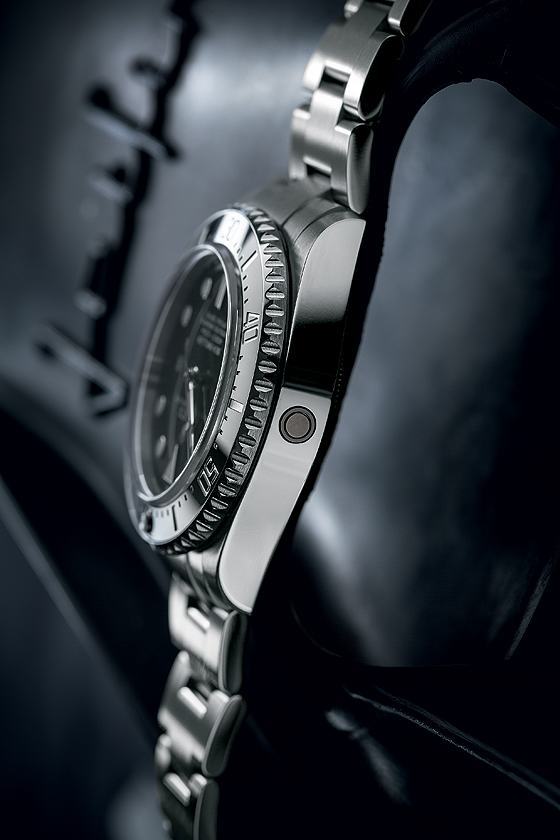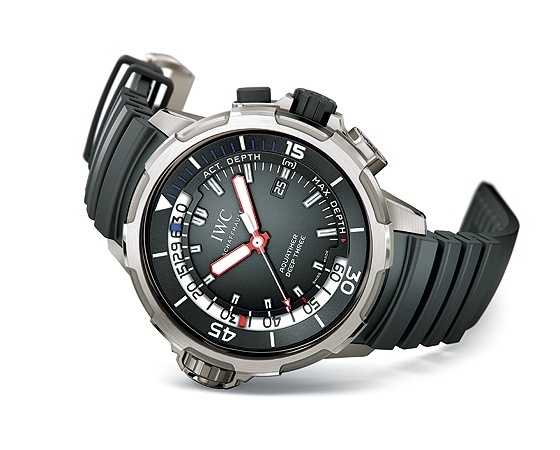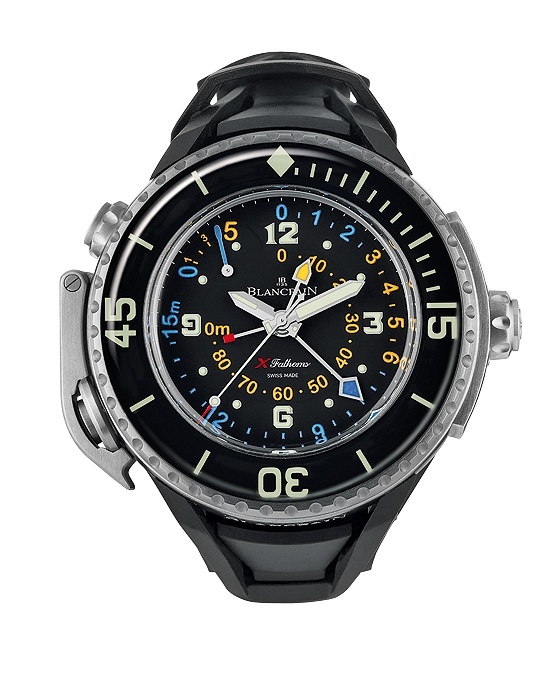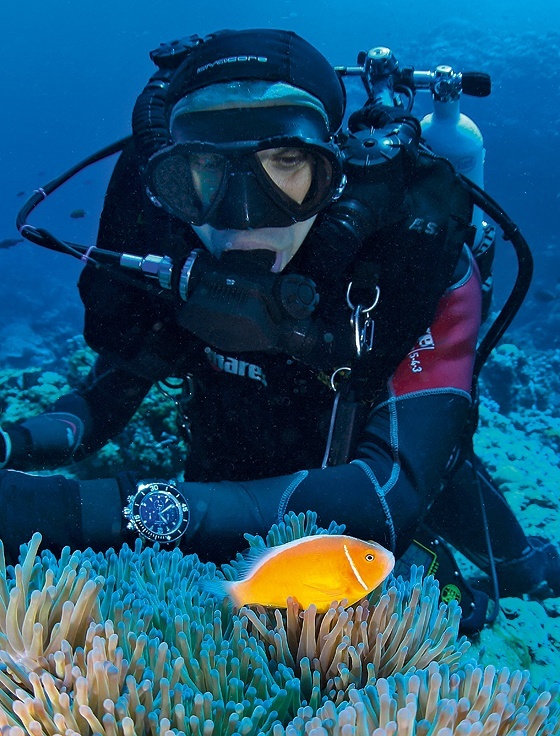We answer your FAQs about water resistance, dive bezels, depth gauges, and more about divers’ watches in this feature from the WatchTime archives.

How water resistant should a dive watch be?
Some manufacturers say that their watches with a water-resistance rating of 300 meters or more are suitable for recreational scuba diving. Others say the watch need have a rating of just 200 meters; still others say it can be 200 meters as long as it is specifically labeled as a dive watch. The International Standards Organization (ISO), on the other hand, stipulates that a dive watch must be water resistant to 100 meters.
All these depth ratings are significantly higher (or lower, if you will) than the depths to which a non-professional diver can dive. Recreational divers don’t go deeper than 40 meters (130 feet). Beyond that, they enter the realm of technical diving, which requires extensive training, special mixed gases to breathe, long decompression stops and special equipment.
The reason for the discrepancy: when tested for water resistance in the factory, the watch is in an artificial environment that is much different from what the watch will face during an actual dive. For the test, the watch is perfectly stationary, the gaskets brand new, and the case newly assembled, so that nothing will compromise its water resistance. The testing machinery does not account for such phenomena as additional pressure from the impact of the wearer’s jumping or diving into the water; or for temperature and pressure changes as the diver ascends and descends, which can cause the case to shrink or expand. Furthermore, a watch’s water resistance will be lessened by aging of the watch’s gaskets. Knocks and other rough treatment can cause the case’s components to fit together less tightly than they did when the watch was brand new. All these imponderables cause the companies to provide a rather large cushion of safety so that customers will not hold them responsible if their watches leak.

What features make a watch impermeable enough for diving?
Several features are required to make a watch impermeable enough to wear diving. In nearly all dive watches, the case has a screw-in back and crown. O-rings are used to seal the crown, caseback and crystal. The case and crystal are thicker than in a non-dive watch. Watches designed for very deep diving often have additional pressure-defying features such as domed crystals, or a steel ring for reinforcing the case (as on the Rolex Deepsea).
What are the other features of a dive watch?
Most dive watches have a rotating bezel for measuring elapsed time. They also have luminous hands and markers that can be read underwater. ISO standard 6425 requires a dive watch to have a “time-preselecting device” (a rotating bezel satisfies this requirement) and a dial that can be read in the dark at a distance of 25 cm. The ISO also says the watch must have an indicator that shows at a glance if the watch is still running. A seconds hand satisfies this requirement. Most dive watches have a steel or titanium bracelet or rubber strap, although some straps are made of nylon or various composite materials. Some dive bracelets and straps are equipped with an extension device that enables the watch to fit over a dive-suit sleeve. Some dive watches have a helium valve and/or a depth sensor.

What is a helium valve?
A device for equalizing the pressure inside and outside the watch case when the watch is worn in a diving chamber. Inside the chamber, divers breathe a gas mixture that contains helium. The helium molecules are extremely small and are hence able to penetrate the watch case, building up inside it. In the process of decompression, the pressure inside the chamber decreases more rapidly than the pressure inside the case. This can cause the watch crystal to pop off. To prevent that, some watches have a valve on the side of the case that allows helium to escape from the case during decompression, making the pressure inside and outside the case the same.
Do many dive watches have helium valves?
Most dive watches do not have helium valves because they are of use only in saturation diving, when a diver spends time in a diving chamber.

Why do the rotating bezels on most dive watches turn in only one direction?
Most dive bezels turn in one direction only, counterclockwise, so that the bezel cannot be accidentally knocked off position in the clockwise direction and thus understate the elapsed time (usually the total dive time) being measured. Some watches solve this problem by using inner rotating bezels that cannot be rotated accidentally.
Many bezels have only the first 15 minutes marked individually. Why?
This is a dive-watch convention that goes back to the mid-1950s (it probably started with the Rolex Submariner). It is unclear what purpose the markers were originally meant to serve. An early Submariner advertisement shows a diver setting the bezel to measure total dive time, then using the minutes markers for a precise reading of his descent time. Why this information is useful is not explained (and standard diving procedures don’t require it).
An oft-tendered explanation for the markers is that they are used to time decompression stops, but this explanation is problematic. The diver would have to reset the bezel at the beginning of each stop. The bezel could not therefore be used to measure total dive time, the main purpose of the bezel.
One possible explanation for the markers: 15 minutes is the approximate amount of time a diver can spend at 130 feet, the maximum depth for recreational diving, without making decompression stops. The markers might have been intended to alert him to that limit and help him read his remaining bottom time precisely. This theory is supported by some versions of the Omega Seamaster, which had gradations for the first 20 minutes (a diver can spend about 20 minutes at 110 feet, close to the depth limit). On the Seamaster 200, the 20-minute segment was painted fire-engine red, possibly to warn the diver of the hazard of staying deep for too long.

How do depth-gauge watches work?
In most, there is a sensor (typically a membrane or diaphragm) on the side of the case that is distorted by water pressure. The degree of distortion is then converted into feet or meters of depth and displayed by hands on the watch face. Oris, in its Aquis model, uses another type of depth gauge: it has a tubule around the perimeter of the crystal with a tiny opening to the outside. More or less water enters the tubule, depending on the depth, and the diver can read the depth in meters on the scale next to the tubule.
How many mechanical dive watches have depth gauges?
Just a handful. Aside from the aforementioned Oris Aquis Depth Gauge, other mechanical watches with depth gauges include the Blancpain X Fathoms, the IWC Aquatimer Deep Three, the Jaeger-LeCoultre Master Compressor Diving Pro Geographic and the Panerai Luminor 1950 Pangaea Depth Gauge (which despite its mechanical movement has an electronic depth gauge).
Some watch depth gauges record the deepest point of a dive. Why?
There are three reasons. First, for safety’s sake, the dive-time limits prescribed by dive tables assume the diver spends his entire dive time at the deepest point of the dive. To use the dive table, the diver must therefore know his deepest point. Second, it is a generally accepted rule of diving that the diver should do the deepest part of the dive first. This gives him the maximum amount of time to off-gas the relatively high amount of nitrogen he absorbed at the bottom of the dive (the lower you go, the more nitrogen dissolves in your blood). Third, many diving experts recommend that, even in no-decompression diving, which doesn’t require decompression stops, the diver make a so-called “safety” stop of one minute halfway between the lowest point of the dive and the surface in order to off-gas nitrogen.


Which mechanical watch has the deepest water-resistance rating?
The CX Swiss Military 20,000 feet. The watch, made of titanium, is nearly 3 cm thick; the crystal alone is 1 cm thick.
In this age of dive computers, are dive watches necessary?
Not really. Divers sometimes take them as backups to their dive computers, should the computers run out of power during a dive, but now that wrist-worn dive computers are widely available and reasonably priced, some divers use these as backups to their console-style computers (or wear two wristwatch-style computers). If a diver does use a watch as a backup, he also needs other backup equipment that supplies information given by a dive computer: a depth gauge, pressure gauge and dive tables.
Then why do so many people buy dive watches?
For several reasons. Many people like the sense of security that a high water-resistance rating provides. If a watch is safe to wear on a deep dive, they reason, surely it is guaranteed to survive a swim or a snorkeling excursion. Others like a dive watch’s other features, such as a rotating bezel or highly luminous hands and markers. For many dive-watch wearers, looks are the main draw: sporty, technical-looking watches are all the rage.




